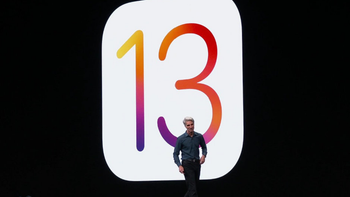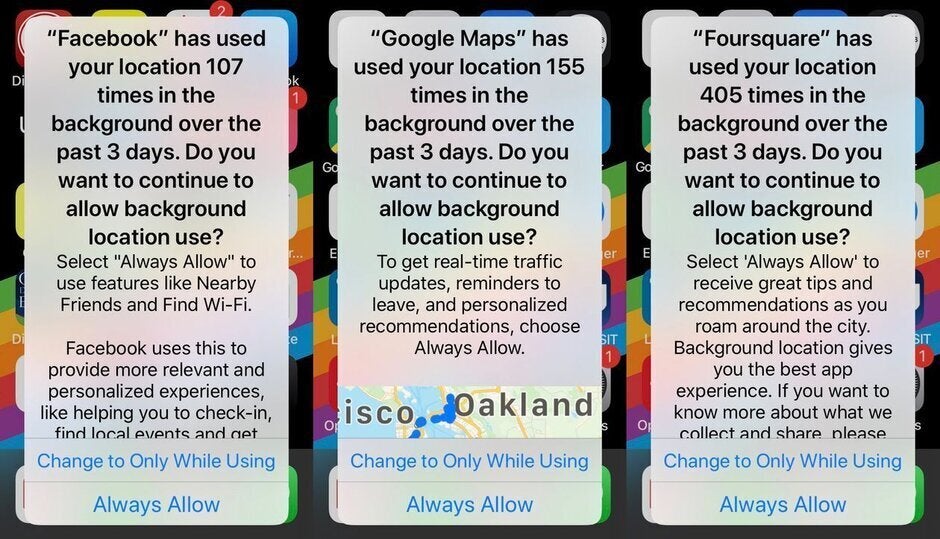New feature has dropped the collection of iOS users' location data by 68%

Earlier this month, we told you that a new feature Apple added in iOS 13 reminds users how many times a particular app tracked their location over the last three days. The pop-up asks whether the iPhone user wants to continue allowing an app to track his or her location in the background (meaning while the app is closed), allow the app to collect location data only in the foreground (while the app is being used), or allow the data to be collected one time only.
Reports at the time indicated that tens of millions of iPhone users had blocked the ability of certain apps to track them.Teemo, a company that develops the software used by apps to collect location data, has noticed a big change. Benoit Grouchko, who runs Teemo, says that three years ago the opt-in rates allowing apps to collect location data while not in use were close to 100%; the opt-in rate for these apps is now often under 50%.Marketers are turning to IP addresses to provide them with less accurate location data that most users cannot block
Marketers are turning to IP addresses to provide them with less accurate location data that most users cannot block
Once iPhone users realized that they had options, something that the new iOS 13 feature helped to make clear, they decided not to allow these apps to track them. Previously, an iPhone user would install an app and it would start tracking their location immediately. Android users have received similar popups asking whether they want to continue sharing their location data and Google says that the opt-in rate for background location tracking is currently 50%.

Screenshots showing the new iOS 13 feature that allows users to opt-out of the collection of location sharing data in the background
It is becoming obvious that iPhone users are beginning to rebel against giving up their location data to advertisers. Another company called Location Sciences, which tracks the accuracy of the data being sold to advertisers, found that seven out of 10 iOS users were downloading iOS 13 in the first six weeks after the final version of it dropped in September. 80% of these users disabled all tracking by background apps. The firm's chief business officer, Jason Smith, says, "People have decided to stop their phones' sharing location data at a universal level." Location Sciences says that the amount of background location data information collected by advertisers has dropped 68% since the launch of iOS 13. During the same time period, data sharing in the foreground (which is when an app is open) dropped 24%.
Smith notes that "You have an environment in which advertisers have been paying for—at a premium cost—high-quality, highly accurate GPS data. They’re now confronted with a phenomenon in which that data is less available. According to Fast Company, the loss of GPS data means that marketers won't be able to know where users went to lunch or the stores that they visited. Some tracking firms might have to turn to Internet Protocol (IP) addresses even though they are not nearly accurate as GPS coordinates are. This information can be collected via a user's cellular or Wi-Fi connection and there are no controls to prevent this on iOS or Android.
However, Virtual Private Networks (VPN) can hide a user's IP address and Google's Fi MVNO service already offers a VPN to subscribers. If this becomes a standard feature on mobile handsets in the future, marketers might have to find another way to serve up ads for products and services that a particular smartphone user is looking for. Location Science's Smith says, "We’re sort of at the precipice of this educational environment in which people are now becoming aware of what their options are, how those options impact the security that they will receive, and how other third-party companies are being respectful and mindful of those options." As a comparison, GPS also for location tracking less than 1km from where a user is actually standing. Fixed IP provides an accuracy of 1km-20km and Dynamic Carrier IP is accurate within 50-1000km.

The difference in the accuracy of location data obtained by GPS and by IP addresses
We should also point out that there are smartphone users who don't mind giving up their location data because it allows ads for the things they want to come to them without having to browse the web to find it. These users are better served by opting-in to having their location data tracked.










Things that are NOT allowed: